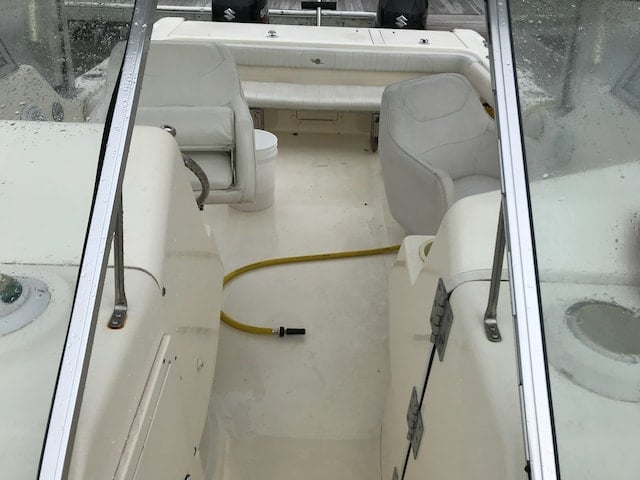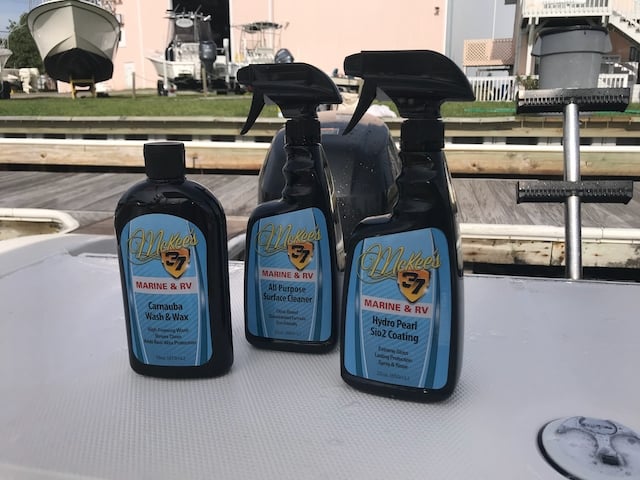How To Clean Boat Seats – What Really Works!

Boat seats can be among the most challenging parts of your boat to maintain. Boat seats take a lot of abuse because people sit on them and tend to place wet stuff on them frequently.
Your boat cushions are made to withstand a lot of abuse and still come out looking clean. However, good maintenance and cleaning is important for your vinyl or leather seats to last as long as they should.
What’s the best way to clean boat seats?
What’s the best way to clean boat seats? The best way to clean boat seats is to clean them regularly with gentle soap and water or a cleaner made specifically for marine vinyl. They should be cleaned whenever they have gotten wet or if you see a stain or mildew spot and regularly every couple of weeks or so.
If you’re wondering how to keep your boat seats as clean as possible, this is everything that you need to know to prevent and clean dirt, mildew, and more from your boat’s interior.
The Best Way to Clean Boat Seats
No matter how hard you work to prevent mildew stains on your boat seats, the reality is that occasionally you will miss something and be left with an ugly stain on your seats. Don’t panic.
You probably will not need to replace the seat or have to learn to live with the stain. Here are some things that you can do to clean vinyl boat seats.
Basic Cleaning
The first step is to use warm soapy water, gently scrub the seat with a plastic bristle brush, and wipe it clean with a towel (this may take a little elbow grease if your seats have deep stains).
A marine cleaner specifically made for marine vinyl seats may also be used and may be more effective if regular soap and water aren’t working for you.
You only want to use the most gentle cleaners because you do not want abrasive material or damaging cleaners to remove the mildew prevention and UV protection with which this vinyl is coated.
If you are thinking that your seat is already stained so why bother protecting the covering, you may want to think again.
It is true that the material can still be damaged when it has the coating, but you are likely to find that the damage is nothing compared to how it would have been without the coating.
3M Marine Vinyl Cleaner
This cleaning product goes further from the standard dish or marine soap cleaner methods.
It can safely clean marine vinyl fabric. As an added benefit, it adds a protectant to the vinyl to extend its life even further.
This is a good product to use when you are cleaning up stains or spills, but it is also a superb option for weekly regular cleaning.
Using a spray cleaner like this can do a lot to improve the life of your vinyl seats over time
Sunscreen
Pen marks can be a challenging and persistent problem on your vinyl boat sheets.
Whether a pen dropped from a pocket or a child has used your seats as a coloring book, these marks can make a dent.
You may be surprised to learn that sunscreen can be a very effective way to remove pen marks and make your seat look new.
Allow the sunscreen to soak in for a brief time, and then carefully clean up both it and the pen stain with warm soapy water.
If you don’t clean the sunscreen thoroughly, you may inadvertently cause another issue by leaving sunscreen to clog the pores of your vinyl.
What Not to Do
If these products don’t work, you may be tempted to turn to an alternative to get those dirty seats clean.
However, the wrong products can be a disaster for your seats. Whatever you do, here are a few products that you shouldn’t try:
- A power washer. The power washer can be a very effective tool for a number of projects around your boat, but it is not a good choice for cleaning vinyl upholstery. The power washer is too intense for this purpose and may damage the boat’s upholstery, causing more harm than good.
- Bleach. If your seats were once white and you’d like them to be white again, bleach may seem like a natural choice. However, bleach will destroy the finish on the vinyl as well as get rid of the stain, reducing the life of the vinyl.
- Goo B Gone or Magic Eraser. These are great products to use around the house, and you may find them functional for some uses on your sailboat as well, but they are not a good choice for cleaning vinyl since they may also remove the protective coating.
- Household cleaners or degreasers. These cleaners are a natural go-to choice for all kinds of boat-related issues but aren’t a good choice for marine vinyl.
Preventing Dirty Boat Seats
Being a boat seat can be a very dirty job. Whatever kind of boat you have, maintaining the seats is likely going to be an important part of upkeep.
After all, you can’t expect anyone to be excited to go out on your boat if they are reluctant to sit on the seats.
Preventing seats from getting dirty in the first place is well worth the effort to reduce the amount of time you’ll spend cleaning up your boat seats later.

Here’s what you need to know to prevent your boat seats from getting tears, rips, or cracks.
If you are dealing with chronic dirty cushions, you may choose to replace them following some of these options.
Marine-Grade Vinyl
If your boat seats are made of the run-of-the-mill vinyl you use for any other outdoor vinyl purpose, you will likely find that you have even more challenges in maintaining it than other boat owners.
Marine-grade vinyl is treated to prevent mold and reduce the negative effects of UV. While it will cost more initially, it will last much longer and take less effort to clean, significantly increasing its value to you over time.
Cover Your Seats
Even if you are using marine-grade vinyl, constantly being bleached by the sun isn’t good for any material. Be sure to cover your seats whenever they are not in use.
Covers are also a good idea when the boat is in use. Provide covers for your guests to sit on when they are dry, and remove the covers once people start jumping in and out of the water.
Be sure that the covers that you use are resistant to UV. It is also important to ensure that the covers will not scratch or damage the vinyl while people are sitting on them.
If possible, it is worth buying or making covers that are adjusted specifically to the shape of your seats so that you don’t miss a single spot.
The sun can be one of the biggest reasons that seats break down, lose their seal against moisture, and begin to develop mildew and gather dirt.
Don’t Leave Moisture on the Seats
Marine vinyl is treated to resist mildew, but it is still a porous material that can easily be damaged if wet or bleed items are left on them.
This can be a significant caveat to those who use covers.
Be sure that you take the seat cover off when your wet guests or equipment is going to sit on the seat.
Leaving damp material on the seat for even a few weeks or in some cases a couple of hours may permanently damage the seats.
Be strict about rules around sitting on the seats. It’s a good idea to provide a lot of surfaces around the cockpit and cabin so that people will have somewhere to put their damp clothes and objects beside the seats.
Wipe Downs and Ventilation
Your seats are bound to get damp every now and then. It is simply not realistic to expect boat seats to stay dry.
However, if you want those seats to stay in good shape while continuing to serve their purpose of being able to stand up to moisture, you’ll need to take good care of them during and between uses.
Wipe down damp seats when you are finished using them. Be especially careful to look for any kinds of stains from spilled food or anything else. Even when all of the surfaces have been wiped down, there may still be some residual moisture left over.
This is why it is so important to maintain quality ventilation on your boat. If you are concerned that seats are still moist when you are done using the boat, it may be best to run AC to dry it out further.

The most common cause of dating on nylon boat seats is mold. Moisture is your enemy in a very significant way when it comes to your boat seats.
Wiping down with a mild soap or white vinegar (no harsh chemicals needed) and providing good ventilation is the best way to keep your cushions safe from mold and looking their best.
Take Good Care of Your Boat Seats
Your boat’s seats will likely take a lot of abuse over time, but it is important to keep them looking their best since they are often one of the features that is most likely to make an impression on your guests.
You can prevent many of the problems that vinyl seats are prone to with quality maintenance. Make sure that you regularly clean your vinyl seats and you will probably find that they serve you well for many years to come.
More Boat Cleaning Topics
- 3 Proven Ways to Remove Mildew From A Boat!
- Best Method To Clean Boat Fenders
- How To Clean Boat Seats – What Really Works!
- The 10 Best Mildew Remover For Boat Seats
- How To Clean Bass Boat Carpet: Tips And Tricks
- How To Clean And Polish Your Aluminum
- The 9 Best Boat Water Spot Removers For Spotless Vessels
- The 10 Most Common Boat Maintenance Tasks
- Can You Use Car Wax On A Boat?
- 9 Best Boat Waxes For Any Type Of Boat



